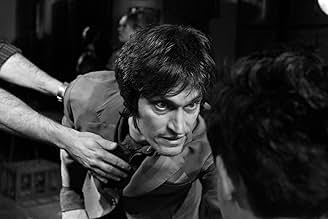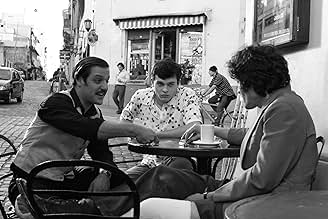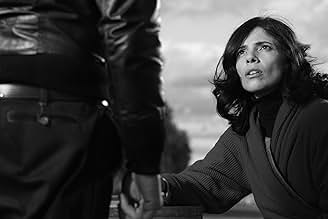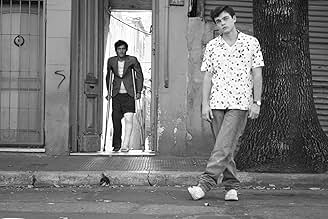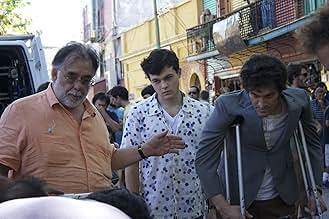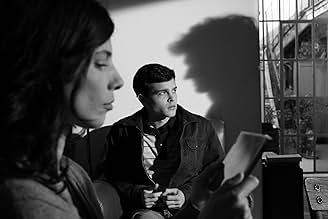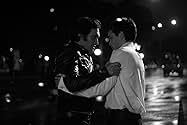AVALIAÇÃO DA IMDb
6,8/10
14 mil
SUA AVALIAÇÃO
Um jovem finalmente se reconecta com seu irmão em Buenos Aires e descobre que o outrora brilhante escritor se transformou em uma pessoa atormentada e autodestrutiva.Um jovem finalmente se reconecta com seu irmão em Buenos Aires e descobre que o outrora brilhante escritor se transformou em uma pessoa atormentada e autodestrutiva.Um jovem finalmente se reconecta com seu irmão em Buenos Aires e descobre que o outrora brilhante escritor se transformou em uma pessoa atormentada e autodestrutiva.
- Direção
- Roteiristas
- Artistas
- Prêmios
- 1 vitória e 6 indicações no total
Rodrigo de la Serna
- José
- (as Rodrigo De La Serna)
Erica Rivas
- Ana
- (as Érica Rivas)
Sofía Gala Castiglione
- María Luisa
- (as Sofía Castiglione)
- Direção
- Roteiristas
- Elenco e equipe completos
- Produção, bilheteria e muito mais no IMDbPro
Avaliações em destaque
The week of his 18th birthday , Bennie (Alden Ehrenreich fim debut) travels to Buenos Aires to find his long-missing older brother . As he seeks out his older brother, the washed-out and disturbed Tetro (George Gallo) , whom he hasn't seen in years. Tetro lives with Miranda, (Maribel Verdú) a happy and always glad woman . He's introducing him as a "friend," refusing Tetro to talk about their family and some thoughts of their nasty dad cast a shadow over both brothers . But every family has a secret and every family has a past . Along the way Bennie's discovery of his worn-out brother's near-finished play might hold the answer to understanding their shared past and renewing their bond .
This an unsettling and interesting film , an intense drama concerning what past has Tetro left behind , being full of emotion , touching scenes , good feeling , marvellous dances inspired by The Hoffman Tales , The Red shoes by Michael Powell/ Emeric Pressburger and a final twist . It is a simple , dramatic and intelligent portrait of two people , focused on brothership , and sibling rivalry which a dark secret will forever change the family's fate . This is an uplifting movie at times , too , not just a tear-jerker or horrific in showing two sibling's suffering , as they attempt to regain the dignity they lost after years spent without seeing . The picture is developed in slow-moving but is pretty well realized . The flick stands out for its melancholy and poignant multilevel exploration of alienation , past records and despair . The story has a certain melancholic style , a climate of transience and sadness that spread the dispute between the two protagonists brothers . Visually it transports one into a dark, grey , nightmarish world but enriched by some colorful images thanks to some flasblacks well photographed by Mihai Malaimare Jr. , these images were shot in colour , but treated to give a slightly faded texture. The screenplay by Coppola himself , acting, direction all come together to create this extraordinary viewing experience . George Gallo gives a nice acting as the burnt-out Tetro , once-promising writer who is now a remnant of his former self , and he is is hot and cold toward his brother . His sibling is finely played by Alden Ehrenreich at his film debut as Bennie, a waiter on a cruise ship who has a layover in Buenos Aires to meet again his brother and subsequently he finds pages of Tetro's unfinished novel, then he pushes both to know his own history and to become a part of his life . Support cast is pretty good with several Argentina/Spain actors such as Maribel Verdú , Carmen Maura , Rodrigo De la Serna , Silvia Pérez , Erica Rivas , Leticia Brédice and special mention for Klaus Maria Brandauer as father .
The motion picture was compellingly directed by Francis Ford Coppola , though far from his greatest successes . Coppola explained that this one was a very "personal" project , being the kind of film he set out to make as a young man, before he was sidetracked by fame , fortune and sucessful boxoffice. Coppola's film The Godfather (1972) became one of the highest-grossing movies in history and brought him an Oscar for writing the screenplay with Mario Puzo The film was a Best Picture Academy Award-winner, and also brought Coppola a Best Director Oscar nomination. Following his work on the screenplay for The Great Gastby (1974), Coppola's next film was The conversation (1974), which was honored with the Golden Palm Award at the Cannes Film Festival, and brought Coppola Best Picture and Best Original Screenplay Oscar nominations. Also released that year, The Godfather: II (1974) , rivaled the big hit of The Godfather (1972) , and won six Academy Awards, bringing Coppola Academy Awards as a producer, director and writer. Coppola then began work on his most important film, Apocalypse Now (1979), a Vietnam War epic that was inspired by Joseph Conrad . Released in 1979, the acclaimed film won a Golden Palm Award at the Cannes Film Festival, and two Oscars. With George Lucas, Coppola executive produced Kagemusha (1980), directed by Akira Kurosawa, and Mishima (1985), directed by Paul Schrader and based on the life and writings of Yukio Mishima . Coppola also executive produced such films as The Escape Artist (1982) , Hammett (1983) , The Black Stallion Returns (1983), Barfly (1987), The Wind (1992) , The secret garden (1993), among others .
This an unsettling and interesting film , an intense drama concerning what past has Tetro left behind , being full of emotion , touching scenes , good feeling , marvellous dances inspired by The Hoffman Tales , The Red shoes by Michael Powell/ Emeric Pressburger and a final twist . It is a simple , dramatic and intelligent portrait of two people , focused on brothership , and sibling rivalry which a dark secret will forever change the family's fate . This is an uplifting movie at times , too , not just a tear-jerker or horrific in showing two sibling's suffering , as they attempt to regain the dignity they lost after years spent without seeing . The picture is developed in slow-moving but is pretty well realized . The flick stands out for its melancholy and poignant multilevel exploration of alienation , past records and despair . The story has a certain melancholic style , a climate of transience and sadness that spread the dispute between the two protagonists brothers . Visually it transports one into a dark, grey , nightmarish world but enriched by some colorful images thanks to some flasblacks well photographed by Mihai Malaimare Jr. , these images were shot in colour , but treated to give a slightly faded texture. The screenplay by Coppola himself , acting, direction all come together to create this extraordinary viewing experience . George Gallo gives a nice acting as the burnt-out Tetro , once-promising writer who is now a remnant of his former self , and he is is hot and cold toward his brother . His sibling is finely played by Alden Ehrenreich at his film debut as Bennie, a waiter on a cruise ship who has a layover in Buenos Aires to meet again his brother and subsequently he finds pages of Tetro's unfinished novel, then he pushes both to know his own history and to become a part of his life . Support cast is pretty good with several Argentina/Spain actors such as Maribel Verdú , Carmen Maura , Rodrigo De la Serna , Silvia Pérez , Erica Rivas , Leticia Brédice and special mention for Klaus Maria Brandauer as father .
The motion picture was compellingly directed by Francis Ford Coppola , though far from his greatest successes . Coppola explained that this one was a very "personal" project , being the kind of film he set out to make as a young man, before he was sidetracked by fame , fortune and sucessful boxoffice. Coppola's film The Godfather (1972) became one of the highest-grossing movies in history and brought him an Oscar for writing the screenplay with Mario Puzo The film was a Best Picture Academy Award-winner, and also brought Coppola a Best Director Oscar nomination. Following his work on the screenplay for The Great Gastby (1974), Coppola's next film was The conversation (1974), which was honored with the Golden Palm Award at the Cannes Film Festival, and brought Coppola Best Picture and Best Original Screenplay Oscar nominations. Also released that year, The Godfather: II (1974) , rivaled the big hit of The Godfather (1972) , and won six Academy Awards, bringing Coppola Academy Awards as a producer, director and writer. Coppola then began work on his most important film, Apocalypse Now (1979), a Vietnam War epic that was inspired by Joseph Conrad . Released in 1979, the acclaimed film won a Golden Palm Award at the Cannes Film Festival, and two Oscars. With George Lucas, Coppola executive produced Kagemusha (1980), directed by Akira Kurosawa, and Mishima (1985), directed by Paul Schrader and based on the life and writings of Yukio Mishima . Coppola also executive produced such films as The Escape Artist (1982) , Hammett (1983) , The Black Stallion Returns (1983), Barfly (1987), The Wind (1992) , The secret garden (1993), among others .
I can see a lot of connection between Copolla's 1983 Rumble Fish and this 2009 Tetro. Firstly there's that same inky black monochrome that's as dark as night and with the occasional splash of colour. Then, there's the brotherly relationship, here between Vincent Gallo and Alden Ehrenreich.
It's a while since I last watched Rumble Fish but the brothers there were Mickey Rourke (a rare good film for him at that time) and Matt Dillon. It's about street gangs and pool halls and how an older brother can be very impressionistic on a younger sibling. I'll say no more, except it's a blinder of a film and better than this.
I would have to say that the monochrome cinematography here, though, that everybody drools over is just too dark and contrasty, for this subject and film. I'm a photographer, so hopefully know and whilst Rumble Fish looked superb, that was full of geometric angles and angular paradoxes. Here, the screen is often plunged into almost darkness much of the time.
There is a balletic beauty to much of it though and we veer away from Rumble Fish and on to his works of epic greatness. The Godfathers and Apocalypse Now all share with this, an operatic build up of artistic and emotional tension that is mesmerising. Tetro has this toward the end at the Festival and we start anticipating something big and great. Do we get it? You'll have to see it yourself...
Others have touched on the actual storyline and I'm going to leave that to them. That said, the cast are all good but oddly, Vincent Gallo, as Tetro seems to short-change us. Not performance wise but in that we just don't seem to get to know him, which is part of the whole story, of course. Clamming up into a shell is nature's way of protecting us, emotionally, which is what Tetro did - and still does.
One major plus to this, very bog-standard DVD, was the sound quality - I 'felt' the sound as much as heard it. It prickled my eardrums with a tactile clarity, certainly Hi-fi standard, plus. OK, it was through separate amp and speakers but is as all my TV watching is.
Is Tetro a film for you? That's a difficult one. Art-house cinema lovers probably will and those who like a drama that is quite complex also but those who want action and something akin to Apocalypse Now, no. It is long, visually rich and dark (like plain chocolate) and accordingly, not for everybody but for those who do, it holds many strengths.
It's a while since I last watched Rumble Fish but the brothers there were Mickey Rourke (a rare good film for him at that time) and Matt Dillon. It's about street gangs and pool halls and how an older brother can be very impressionistic on a younger sibling. I'll say no more, except it's a blinder of a film and better than this.
I would have to say that the monochrome cinematography here, though, that everybody drools over is just too dark and contrasty, for this subject and film. I'm a photographer, so hopefully know and whilst Rumble Fish looked superb, that was full of geometric angles and angular paradoxes. Here, the screen is often plunged into almost darkness much of the time.
There is a balletic beauty to much of it though and we veer away from Rumble Fish and on to his works of epic greatness. The Godfathers and Apocalypse Now all share with this, an operatic build up of artistic and emotional tension that is mesmerising. Tetro has this toward the end at the Festival and we start anticipating something big and great. Do we get it? You'll have to see it yourself...
Others have touched on the actual storyline and I'm going to leave that to them. That said, the cast are all good but oddly, Vincent Gallo, as Tetro seems to short-change us. Not performance wise but in that we just don't seem to get to know him, which is part of the whole story, of course. Clamming up into a shell is nature's way of protecting us, emotionally, which is what Tetro did - and still does.
One major plus to this, very bog-standard DVD, was the sound quality - I 'felt' the sound as much as heard it. It prickled my eardrums with a tactile clarity, certainly Hi-fi standard, plus. OK, it was through separate amp and speakers but is as all my TV watching is.
Is Tetro a film for you? That's a difficult one. Art-house cinema lovers probably will and those who like a drama that is quite complex also but those who want action and something akin to Apocalypse Now, no. It is long, visually rich and dark (like plain chocolate) and accordingly, not for everybody but for those who do, it holds many strengths.
17 year-old Bennie works as a waiter on a cruiseship. When the ship suffers engine difficulties and docks in Buenos Aires, he uses the opportunity to attempt to reconnect with his estranged brother Tetro, a once promising writer. He is welcomed with open arms by Tetro's girlfriend, Miranda. She longs to know the truth behind her boyfriends past and what made him the misanthrope he is today. Tetro is hostile towards his brother, his plan was to never see any of his family again, and so keeps him at arms length. Bennie discovers an incomplete play, written in code whilst his brother was undergoing psychiatric treatment. He decides to finish the play and enter it in a festival run by Argentina's most powerful critic, Alone. Faced with this upheaval, Tetro is forced to come to terms with his relationship to his younger brother and his father, a famous conductor.
Tetro is, at its core, a film about family, in particular the relationship between brothers and their Father. A theme Francis Ford Coppola has immersed himself in before, most notably in The Godfather and Rumble Fish. Through a series of flashbacks we are given a glimpse of major events in Tetro's youth, his relationship with his father (played by Klaus Brandauer) and his subsequent departure. There are huge family secrets known only to Tetro and revealed to Bennie in an ending which echoes great literary and operatic works. Coppolas love of opera and theater is stamped all over the script and the city of Buenos Aires seems to be the perfect background in which to set this story.
Shot stunningly in digital monochrome with colour flashbacks, it has some aesthetic similarities to Rumble Fish. Coppola and cinematographer Mihai Malaimare Jr. reportedly site On The Waterfront and La Notte as big influences on the films visual style. There are certainly elements of both here, with the film also retaining its visual sense of self. It is operatic in both its narrative and its mise-en-scene. The idea of cutting between colour and monochrome as well as changing aspect ratios sounds as if it would be jarring, and it typically is. But for the purposes of Tetro it works perfectly.
Seen as a controversial choice by some, Vincent Gallo brings an edge to the titular character that some other actors may have lacked. However it is newcomer Alden Ehrenreich who steals the show as Bennie, a wayward teenager looking for guidance and approval. Maribel Verdu, as Miranda, provides the conduit between the two in a typicaly solid performance.
Hollywood is littered with once great directors who have fallen from grace, which makes Tetro all the more remarkable as a return to form from one of the greatest, Francis Ford Coppola.
Tetro is, at its core, a film about family, in particular the relationship between brothers and their Father. A theme Francis Ford Coppola has immersed himself in before, most notably in The Godfather and Rumble Fish. Through a series of flashbacks we are given a glimpse of major events in Tetro's youth, his relationship with his father (played by Klaus Brandauer) and his subsequent departure. There are huge family secrets known only to Tetro and revealed to Bennie in an ending which echoes great literary and operatic works. Coppolas love of opera and theater is stamped all over the script and the city of Buenos Aires seems to be the perfect background in which to set this story.
Shot stunningly in digital monochrome with colour flashbacks, it has some aesthetic similarities to Rumble Fish. Coppola and cinematographer Mihai Malaimare Jr. reportedly site On The Waterfront and La Notte as big influences on the films visual style. There are certainly elements of both here, with the film also retaining its visual sense of self. It is operatic in both its narrative and its mise-en-scene. The idea of cutting between colour and monochrome as well as changing aspect ratios sounds as if it would be jarring, and it typically is. But for the purposes of Tetro it works perfectly.
Seen as a controversial choice by some, Vincent Gallo brings an edge to the titular character that some other actors may have lacked. However it is newcomer Alden Ehrenreich who steals the show as Bennie, a wayward teenager looking for guidance and approval. Maribel Verdu, as Miranda, provides the conduit between the two in a typicaly solid performance.
Hollywood is littered with once great directors who have fallen from grace, which makes Tetro all the more remarkable as a return to form from one of the greatest, Francis Ford Coppola.
One thing that's clear from 'Tetro', Francis Coppola's beautiful, disturbing, very personal new film (a great improvement over his 'Youth Without Youth' of two years ago) is that whether its themes are autobiographical or not, they show a man who still has strong feelings about family and a wealth of artistic ideas about how to act them out. Family seems a poisonous and irresistible thing. When Vincent Gallo tells Alden Ehrenreich at the end of the film, "We're family," it sounds as haunting as "Forget It, Jake - It's Chinatown" at the end of Roman Polanski's movie. Family, like Chinatown, is a place of mysterious trouble, of rivalries that come back to haunt you, of resentments and terrible deceptions.
There's a lot of pain about failed ambitions too. Tetro (a mean, brooding Vincent Gallo;"tetro" means 'sad' or 'dark' in Italian), a would-be writer, is hiding away in Buenos Aires, the birthplace of his father, when his younger brother Bennie (excellent newcomer Alden Ehrenreich) appears one night in the pristine white uniform of a cruise ship employee. The action thenceforth is an off-and-on wooing of Tetro by Bennie. Bennie wants to recover his childhood when he worshiped Angelo, as he was then. "Angelo's dead," Tetro repeats. Bennie has felt abandoned for a decade. He is almost eighteen, and ran away from military school and lied about his age to get the job on the ship. Now Tetro does not welcome Bennie at all and keeps saying he ought to stay with someone else or return to the boat, which is docked for repairs.
The 'Godfather' films are full of brother and father rivalries too, but because this film is about waywardness and is in coldly beautiful digital black and white with moments of intense color, it more strongly recalls Coppola's similarly color-highlighted black and white version of S.E. Hinton's 'Rumblefish,' where Mickey Rourke played the dangerous, disreputable but romantic older brother and Matt Dillon the younger one who has missed him.
This certainly isn't Tusa, though. It's Argentina, but also an alternately windswept and mountainous Patagonia, and a world of pure cinematic imagination highlighted by trips into intense Fifties Technicolor with The Red Shoes and The Tales of Hoffman and Copola's own strange evocations of that lushly artificial style. Flashbacks in less intense color recall the father -- perhaps one should write "the Father" -- Carlo Tetrocini (Klaus Maria Brandauer), born in Buenos Aires of Italian family, a composer and orchestra leader hailed as a genius. Carlo has stifled the ambitions of another musical composer brother (played by Brandauer in heavy makeup) and seems to have driven Tetro (Gallo) mad. Tetro lives a bipolar, cosmopolitan life with a warm and sexy Spanish lady called Miranda (Maribel Verdú: we know her from 'Y tu mamá también' and 'Pan's Labyrinth') who discovered him when he was in an asylum and she was a visiting entertainer. Tetro has all but abandoned his magnum opus, a play he can't finish, and works in a theater where he does the lighting.
One can hardly attribute the resentment of the father to Coppola himself; his own father was a minor musician best known for composing music for Coppola's films. Perhaps he himself is the evil father? But then what to make of Sofia Coppola, the acclaimed and successful daughter, a fine director in her own right? The Oedipal themes that arise may be more universal than autobiographical. The mother in Tetro however, is partly missing from the equation, a shadowy figure who who died in a car accident when Tetro/Angelo was driving. There are so many references to accidents one begins to fear one every time somebody goes out. And indeed walking a dog proves dangerous.
Bennie discovers Tetro's hidden manuscripts, which, like hidden memories, are written in mirror writing he says is "military school code." Among various Argentinian friends the youth meets "the most famous critic in Latin America," a woman who calls herself "Alone" (Carmen Maura, another Spanish actress, whom we know from films by Pedro Almodóvar). When Benie first arrives, Tetro has a broken leg. Later he breaks a leg himself, and while recovering he transcribes the MS. into normal writing and adds an ending. "Alone" runs an arts festival in Patagonia, and he has the unwitting collaboration translated into Spanish and enters in the festival competition, which it wins. Tetro rejects all this. Gallo's evocations of depression, anger, and hostility are extremely realistic. His final revelations and eventual warm acceptance of Bennie, whose accident causes him to miss his boat, are perhaps less convincing, though his performance is strong. Ehrenreich, who sometimes resembles a young, but more physically solid Leo DiCaprio, is touching and appealing.
It's not clear at first what the Powell/Pressberger 'Red Shoes' and 'Tales of Hoffman' have to do with the story, except that Tetro took Bennie to see them. But they illustrate a sensibility so steeped in cinema that it can't evoke emotion without remembering films. Everything in Tetro is highly artificial, or simply cinematic, but also convincingly emotional. The tensions between the brothers have been compared to those in Kazan's 'East of Eden,' and Coppola indeed thought of Kazan in making this film and has spoken of a felt rivalry with him. The Patagonian arts festival sequences recall both Fifties comedies and Fellini. For all this artificiality, the film stirred up plenty of discomfort in me. One can perfectly well awaken painful emotions by mimicking old films, as Todd Haynes did in his odd pastiche of Douglas Sirk, 'Far From Heaven.' 'Tetro' doesn't feel resolved; it has a little of the rambling incoherence of 'Youth Without Youth,' except that it is so much more intensely felt. Above all it is a unique work that is beautiful to look at and keeps one guessing. Coppola has said this is the kind of movie he wanted to make when he was young. Very well, it's a bit late for that; but why not?
There's a lot of pain about failed ambitions too. Tetro (a mean, brooding Vincent Gallo;"tetro" means 'sad' or 'dark' in Italian), a would-be writer, is hiding away in Buenos Aires, the birthplace of his father, when his younger brother Bennie (excellent newcomer Alden Ehrenreich) appears one night in the pristine white uniform of a cruise ship employee. The action thenceforth is an off-and-on wooing of Tetro by Bennie. Bennie wants to recover his childhood when he worshiped Angelo, as he was then. "Angelo's dead," Tetro repeats. Bennie has felt abandoned for a decade. He is almost eighteen, and ran away from military school and lied about his age to get the job on the ship. Now Tetro does not welcome Bennie at all and keeps saying he ought to stay with someone else or return to the boat, which is docked for repairs.
The 'Godfather' films are full of brother and father rivalries too, but because this film is about waywardness and is in coldly beautiful digital black and white with moments of intense color, it more strongly recalls Coppola's similarly color-highlighted black and white version of S.E. Hinton's 'Rumblefish,' where Mickey Rourke played the dangerous, disreputable but romantic older brother and Matt Dillon the younger one who has missed him.
This certainly isn't Tusa, though. It's Argentina, but also an alternately windswept and mountainous Patagonia, and a world of pure cinematic imagination highlighted by trips into intense Fifties Technicolor with The Red Shoes and The Tales of Hoffman and Copola's own strange evocations of that lushly artificial style. Flashbacks in less intense color recall the father -- perhaps one should write "the Father" -- Carlo Tetrocini (Klaus Maria Brandauer), born in Buenos Aires of Italian family, a composer and orchestra leader hailed as a genius. Carlo has stifled the ambitions of another musical composer brother (played by Brandauer in heavy makeup) and seems to have driven Tetro (Gallo) mad. Tetro lives a bipolar, cosmopolitan life with a warm and sexy Spanish lady called Miranda (Maribel Verdú: we know her from 'Y tu mamá también' and 'Pan's Labyrinth') who discovered him when he was in an asylum and she was a visiting entertainer. Tetro has all but abandoned his magnum opus, a play he can't finish, and works in a theater where he does the lighting.
One can hardly attribute the resentment of the father to Coppola himself; his own father was a minor musician best known for composing music for Coppola's films. Perhaps he himself is the evil father? But then what to make of Sofia Coppola, the acclaimed and successful daughter, a fine director in her own right? The Oedipal themes that arise may be more universal than autobiographical. The mother in Tetro however, is partly missing from the equation, a shadowy figure who who died in a car accident when Tetro/Angelo was driving. There are so many references to accidents one begins to fear one every time somebody goes out. And indeed walking a dog proves dangerous.
Bennie discovers Tetro's hidden manuscripts, which, like hidden memories, are written in mirror writing he says is "military school code." Among various Argentinian friends the youth meets "the most famous critic in Latin America," a woman who calls herself "Alone" (Carmen Maura, another Spanish actress, whom we know from films by Pedro Almodóvar). When Benie first arrives, Tetro has a broken leg. Later he breaks a leg himself, and while recovering he transcribes the MS. into normal writing and adds an ending. "Alone" runs an arts festival in Patagonia, and he has the unwitting collaboration translated into Spanish and enters in the festival competition, which it wins. Tetro rejects all this. Gallo's evocations of depression, anger, and hostility are extremely realistic. His final revelations and eventual warm acceptance of Bennie, whose accident causes him to miss his boat, are perhaps less convincing, though his performance is strong. Ehrenreich, who sometimes resembles a young, but more physically solid Leo DiCaprio, is touching and appealing.
It's not clear at first what the Powell/Pressberger 'Red Shoes' and 'Tales of Hoffman' have to do with the story, except that Tetro took Bennie to see them. But they illustrate a sensibility so steeped in cinema that it can't evoke emotion without remembering films. Everything in Tetro is highly artificial, or simply cinematic, but also convincingly emotional. The tensions between the brothers have been compared to those in Kazan's 'East of Eden,' and Coppola indeed thought of Kazan in making this film and has spoken of a felt rivalry with him. The Patagonian arts festival sequences recall both Fifties comedies and Fellini. For all this artificiality, the film stirred up plenty of discomfort in me. One can perfectly well awaken painful emotions by mimicking old films, as Todd Haynes did in his odd pastiche of Douglas Sirk, 'Far From Heaven.' 'Tetro' doesn't feel resolved; it has a little of the rambling incoherence of 'Youth Without Youth,' except that it is so much more intensely felt. Above all it is a unique work that is beautiful to look at and keeps one guessing. Coppola has said this is the kind of movie he wanted to make when he was young. Very well, it's a bit late for that; but why not?
After a career that has consisted of the "Godfather" movies, "Apocalypse Now", "The Outsiders", Bram Stoker's "Dracula" and "Youth without Youth" - to name just a few - where would Francis Ford Coppola go next? He directed "Tetro", about the secret history of an Italian-Argentinian family.
Benjamin Tetrocini (Alden Ehrenreich) arrives in Buenos Aires and goes to visit his brother Angelo (Vincent Gallo). The embittered Angelo is now going by the name Tetro. As the movie progresses, a series of important topics about the family gets revealed, and how it has always affected the relationship between the two brothers.
Coppola uses one of the most unusual devices to tell the story. The present is filmed in stark black-and-white, while the past is shown in a slightly grainy color. It's as if the past was supposedly apparent - to show that the characters thought that they knew everything that was going on - while the present is supposedly unclear (to show that there are things to be discovered). I read that the movie pays homage to "The Tales of Hoffman", but I don't know that one, so I have to take the movie at face value. And what I saw certainly impressed me. I definitely recommend this movie.
Also starring Maribel Verdú, Carmen Maura, Klaus Maria Brandauer, and Rodrigo de la Serna (who co-starred in "The Motorcycle Diaries" and is a relative of Che Guevara).
Benjamin Tetrocini (Alden Ehrenreich) arrives in Buenos Aires and goes to visit his brother Angelo (Vincent Gallo). The embittered Angelo is now going by the name Tetro. As the movie progresses, a series of important topics about the family gets revealed, and how it has always affected the relationship between the two brothers.
Coppola uses one of the most unusual devices to tell the story. The present is filmed in stark black-and-white, while the past is shown in a slightly grainy color. It's as if the past was supposedly apparent - to show that the characters thought that they knew everything that was going on - while the present is supposedly unclear (to show that there are things to be discovered). I read that the movie pays homage to "The Tales of Hoffman", but I don't know that one, so I have to take the movie at face value. And what I saw certainly impressed me. I definitely recommend this movie.
Also starring Maribel Verdú, Carmen Maura, Klaus Maria Brandauer, and Rodrigo de la Serna (who co-starred in "The Motorcycle Diaries" and is a relative of Che Guevara).
Você sabia?
- CuriosidadesFrancis Ford Coppola claimed that this is the kind of film he set out to make as a young man, before he was sidetracked by fame and fortune.
- Erros de gravaçãoEarly in the movie Tetro stumbles into the kitchen with a broken leg and knocks over some furniture while lighting a cigarette using a burner on the stove. he ignites the burner by just turning the knob on the stove. A few minutes later Miranda must use a match to light a burner on the same stove-top.
- ConexõesFeatured in At the Movies: Cannes Film Festival 2009 (2009)
- Trilhas sonorasEl Búho
(2007) (uncredited)
Written & Performed by Lisandro Aristimuño
Courtesy of Los Años Luz Discos SRL
Principais escolhas
Faça login para avaliar e ver a lista de recomendações personalizadas
- How long is Tetro?Fornecido pela Alexa
Detalhes
- Data de lançamento
- Países de origem
- Idiomas
- Também conhecido como
- Francis Ford Coppola's Tetro
- Locações de filme
- Empresas de produção
- Consulte mais créditos da empresa na IMDbPro
Bilheteria
- Orçamento
- US$ 5.000.000 (estimativa)
- Faturamento bruto nos EUA e Canadá
- US$ 518.522
- Fim de semana de estreia nos EUA e Canadá
- US$ 30.504
- 14 de jun. de 2009
- Faturamento bruto mundial
- US$ 2.874.474
- Tempo de duração
- 2 h 7 min(127 min)
- Cor
- Mixagem de som
- Proporção
- 2.35 : 1
Contribua para esta página
Sugerir uma alteração ou adicionar conteúdo ausente







